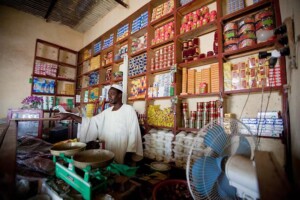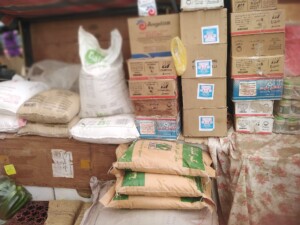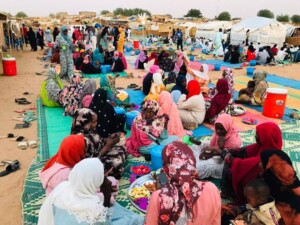CIPE Sudan: $15B lost to war, consequences to be felt ‘even if it stops now’

Logo of the Centre For International Private Enterprise (Photo: CIPE)
Yesterday, Radio Dabanga interviewed Shaza Balla, country director of the Centre for International Private Enterprise (CIPE) in Sudan, to discuss the profound impact of the ongoing war on the Sudanese economy. Balla shared data indicating the extensive destruction across various sectors—commercial, industrial, agricultural, and service—amounting to $15 billion by the year’s end.
Since war broke out between the Sudan Armed Forces (SAF) and the paramilitary Rapid Support Forces (RSF) on April 15, the Sudanese economy has faced the destruction of production capabilities, the halt of industrial and service production, a reduction in agricultural areas, a decline in foreign trade, and the rapid weakening of citizens’ purchasing power.
Balla, director of CIPE’s Sudan office, touched upon the widespread repercussions of the war on all facets of the Sudanese economy in an interview with Radio Dabanga yesterday. “The Sudanese economy was already under strain since the December 2021 military coup, which disrupted economic reform attempts. The current war has led to an accumulated collapse with enduring consequences, even if the war were to cease immediately.”
Acknowledging the difficulties in obtaining accurate information due to the collapse of key institutions like Sudan’s Central Bureau of Statistics and the Central Bank of Sudan, Balla noted some recent studies on the war’s economic impact, including estimates by the International Food Policy Research Institute (IFPRI) in collaboration with USAID and the World Bank. “These estimates project losses of about $15 billion if the war persists until the year’s end, equivalent to 48 per cent of Sudan’s GDP.”
The CIPE Sudan director explained that by June, approximately a month and a half into the war, Sudan had already lost $5 billion in GDP. “Projections indicated an additional $5 billion loss if the conflict would continue until September, resulting in a total GDP loss of $15 billion by then”, she added.
Sectors hit
According to Balla, up to 70 per cent of the industrial sector experienced losses in production inputs, workforce, and crucial ports, including Khartoum International Airport, majorly impacting the sector.
“The agricultural sector, mainly located outside Khartoum, faced a comparatively lower impact, estimating losses at around 20 per cent”, she continued. “In the service sector, losses reached 50 per cent, with an expected five million job losses by year-end, particularly in Khartoum and Darfur.”
However, she stressed that the actual losses are likely much higher, especially in the informal sector that allegedly comprises of about 70 per cent of Sudan’s work force.
The impact has been less severe on small businesses, some of whom adapted better than large companies by relocating their operations.
However, “the recent advancement of the war towards previously safe areas like El Gezira and the White Nile region suggests a worsening situation”, she warned.
Meeting needs
Imports to meet humanitarian needs have been severely hampered by the consequences of the war, Bala stated. “Desert paths, crucial for livestock exports, lack necessary infrastructure like paved roads and railway lines, resulting in significant losses during transportation.”
“The slaughtered meat industry similarly faces challenges due to halted operations at slaughterhouses, with only small facilities in Northern State operating at limited capacity,” the CIPE Sudan director continued. The Red Sea harbours “now import more than they export”, emphasising the scale of impact on trade dynamics.
“A study by the Asar Relief Organisation on the Port Sudan imports and exports reveals a heavy reliance on imports, covering everything from fuel to everyday items like water, tea, and coffee.” Despite the challenges, trade between Sudan and Egypt has increased, with a “visible build-up of lorries at the crossing”.
Certain activities, like mining, remain relatively unaffected, and smuggling from and to neighbouring countries, persist to avoid customs duties and taxes.
Markets
The necessity to import essential goods for safe areas raises concerns about the possibility to do this. “The encroachment of war into new areas previously considered safe further complicates the delivery of imported products to those in need. For instance, goods destined for Wad Madani [capital of El Gezira] may not reach the city in light of last week’s clashes”.
Some markets in the capital Khartoum witnessed significant price drops over the past few days due to an influx of goods from El Gezira. Traders said that large quantities of items stolen from people in El Gezira, which has been under RSF control since December 19, were on sale in Khartoum markets.
Bala noted that many Sudanese currently rely on their pre-war savings, “which are expected to deplete at any moment. But war often prompts people to find alternative livelihoods, and a war economy emerges to supply both warring parties with essential provisions for battle.”
The CIPE country director pointed to a report of the Central Bank of Sudan that reported that the more than 50 per cent decline in incomes has pushed two million Sudanese to join the existing 26 million people in the country who were already living below the poverty line since 2019.
Despite the challenging economic conditions, Bala expects that commercial activities associated with the war may persist. “People might innovate through partnerships and exchange-based work, using foreign currencies as the value of the Sudanese currency continues to plummet,” Balla said, drawing parallels with previous wars, “where currencies from Eritrea, Ethiopia, and Chad were used for commercial exchange due to the devaluation and scarcity of the local currency”.
Balla warned of a potential catastrophe if the Bankak (Your bank) application, the digital payment means of the Bank of Khartoum, were to cease, “as the lack of cash necessitates Bankak’s widespread use in the absence of any Sudanese currency printing”.











 and then
and then